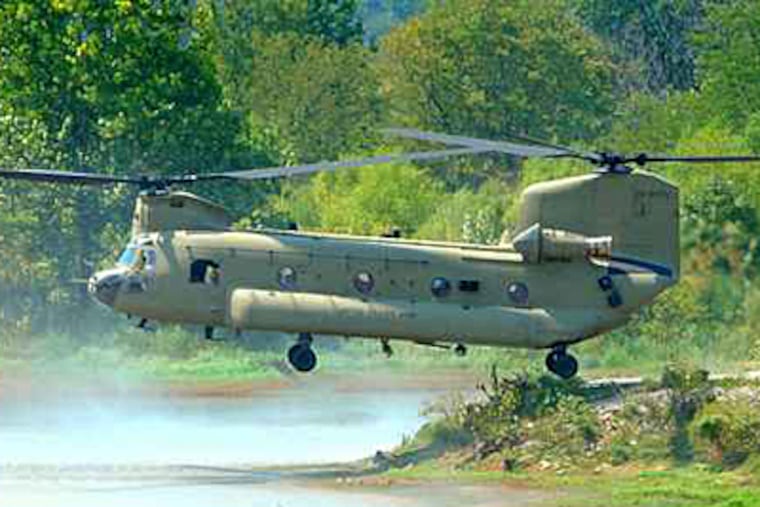Boeing plant halts Chinook production
Boeing Co. abruptly shut down production of Chinook helicopters at its Ridley Township plant yesterday and summoned a U.S. Army investigative team after the company detected "possible manufacturing irregularities" in two of the combat helicopters, which cost up to $30 million apiece.

Boeing Co. abruptly shut down production of Chinook helicopters at its Ridley Township plant yesterday and summoned a U.S. Army investigative team after the company detected "possible manufacturing irregularities" in two of the combat helicopters, which cost up to $30 million apiece.
More than 100 Boeing workers were dismissed at midday, and hundreds of others on the evening shift reported to work only to assist with inspections. All assembly work was halted.
The problems were detected in a new Chinook model - CH-47F - that has not yet been deployed to combat zones.
The company, during a routine inspection, became concerned about two aircraft in final stages of completion, Boeing spokesman Joseph L. LaMarca Jr. said.
Army investigators with the Defense Contract Management Agency were on their way last night to the Boeing Rotorcraft Division to inspect the two helicopters in question, LaMarca said. The Army had notified the FBI as a matter of course, he said, but the bureau was not involved in the probe.
When asked if the investigation was criminal in nature, LaMarca replied: "We don't know that at this point."
U.S. Rep. Joe Sestak, whose district includes the plant, said officials had told him wires that appeared to be broken or severed were found in one helicopter. He also said a washer was found in a second.
It was unclear how long the assembly line - the only one for Chinooks in the United States - would remain off-line.
"It was determined that an investigation needed to be launched to make sure that this was an isolated incident," LaMarca said.
The aircraft at issue are part of a long-term Boeing Army contract for 458 Chinook CH-47F models and MH-47G models through 2018. Some are being built from scratch and others are being "remanufactured" using recycled D-model Chinook parts on a new fuselage.
The contract is part of an effort to modernize the Army's Chinook fleet. The helicopter's tandem rotor and lack of a tail rotor make it ideal for combat in high-altitude regions, such as the mountains of Afghanistan and Iraq.
The apparent irregularities that prompted the shutdown were in two of the F models, LaMarca said.
He would not describe what sort of irregularities had been detected in the two Chinook CH-47F helicopters in question, and said the company did not believe there was a problem with helicopters already delivered.
The irregularities were detected by Boeing quality-assurance staff on an assembly line that had eight helicopters in various stages of production.
"We check these helicopters over from head to toe to make sure everything is done to specification so that we provide the safest, most reliable helicopter," LaMarca said.
The helicopters cost between $20 million and $30 million each.